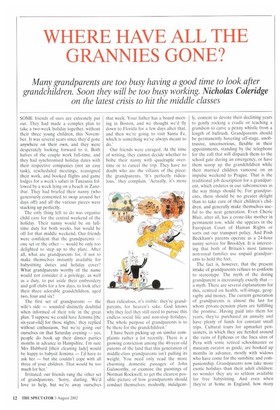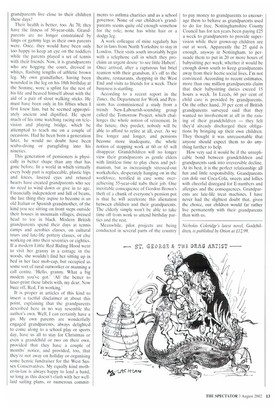WHERE HAVE ALL THE GRANNIES GONE?
Many grandparents are too busy having a good time to look after
grandchildren. Soon they will be too busy working. Nicholas Coleridge
on the latest crisis to hit the middle classes
SOME friends of ours are extremely put out. They had made a complex plan to take a two-week holiday together, without their three young children, this November. It was several years since they'd gone anywhere on their own, and they were desperately looking forward to it. Both halves of the couple work full-time, and they had synchronised holiday dates with their respective companies (not an easy task), rescheduled meetings, reassigned their work, and booked flights and game lodges for a week's safari in Tanzania followed by a week lying on a beach in Zanzibar. They had briefed their nanny (who generously consented to swap around her days off) and all the various pieces were stacking up perfectly.
The only thing left to do was organise child care for the central weekend of the holiday. Their nanny would be on fulltime duty for both weeks, but would be off for that middle weekend. Our friends were confident that the grandparents — one set or the other — would be only too delighted to step up to the plate. After all, what are grandparents for, if not to make themselves instantly available for babysitting duties and holiday cover? What grandparents worthy of the name would not consider it a privilege, as well as a duty, to put aside their embroidery and golf clubs for a few days, to look after their three adorable grandchildren, aged two, four and six?
The first set of grandparents — the wife's side — sounded distinctly doubtful when informed of their role in the great plan. 'I suppose we could have Jemima [the six-year-old] for those nights.' they replied without enthusiasm, 'but we're going out ourselves on that Saturday evening — yes, people do book up their dinner parties months in advance in Hampshire. I'm sure Mrs Hubbard [their cleaning lady] would be happy to babysit Jemima — I'd have to ask her — but she couldn't cope with all three of your children. That would he too much for her.' that week. Your father has a board meeting in Boston, and we thought we'd fly down to Florida for a few days after that, and then we're going to visit Santa Fe, which is something we've always meant to do.'
Our friends were enraged. At the time of writing, they cannot decide whether to bribe their nanny with quadruple overtime or to cancel the trip. They have no doubt who are the villains of the piece: the grandparents. 'It's perfectly ridiculous,' they complain. 'Actually, it's more than ridiculous, it's risible: they're grandparents, for heaven's sake. God knows why they feel they still need to pursue this endless social life and non-stop holidays. The whole purpose of grandparents is to he there for the grandchildren.'
I have been picking up on similar complaints rather a lot recently. There is a growing conviction among the 40-year-old parents of the land that this generation of middle-class grandparents isn't pulling its weight. You need only read the more charming domestic passages of John Galsworthy, or examine the paintings of Norman Rockwell, to get the clearest possible picture of how grandparents should conduct themselves: modestly, indulgent
ly, content to devote their declining years to gently rocking a cradle or teaching a grandson to carve a penny whistle from a length of bullrush. Grandparents should be permanently hovering off-stage, unobtrusive, uncensorious, flexible in their appointments, standing by the telephone for the call that will dispatch them to the school gate during an emergency, or have them scoop up the grandchildren while their married children vamoose on an impulse weekend to Prague. That is the traditional job description for a grandparent, which endures in our subconscious as the way things should be. For grandparents, there should be no greater delight than to take care of their children's children, and generally make themselves useful to the next generation. Even Cherie Blair, after all, has a crone-like mother in permanent tow, while she appears in the European Court of Human Rights or sorts out our transport policy. And Posh Beckham's parents operate as a 24-hour nanny service for Brooklyn. It is interesting that both of Britain's most famous non-royal families use unpaid grandparents to hold the fort.
The fact is, however, that the present intake of grandparents refuses to conform to stereotype. The myth of the doting grandparent is increasingly exactly that — a myth. There are several explanations for this, centred on health, self-image, geography and money. The current generation of grandparents is almost the last for whom private-pension plans are fulfilling the promise. Having paid into them for years, they've purchased an annuity and have plenty of funds for constant small trips. Cultural tours for upmarket pensioners, in which they are herded around the ruins of Ephesus or the Inca sites of Peru with some retired schoolmaster or museum curator as guide, arc booked up months in advance, mostly with widows who have come for the sunshine and companionship. Grandparents now take more exotic holidays than their adult children: no wonder they are so seldom available for free babysitting. And even when they're at home in England, how many grandparents live close to their children these days?
Their health is better, too. At 70, they have the fitness of 50-year-olds. Grandparents are no longer constrained by limps or gammy legs as their own parents were. Once, they would have been only too happy to keep an eye on the toddlers while the parents played a set of tennis with their friends. Now, it is grandparents who are hogging the court, dressed in whites, flashing lengths of athletic brown leg. My own grandfather, having been wounded in the leg on his 18th birthday at the Somme, wore a splint for the rest of his life and heaved himself about with the aid of a pair of stout walking sticks. He must have been only in his fifties when I first knew him, but he seemed appropriately ancient and dignified. He spent much of his time watching racing on television and playing bridge, which he attempted to teach me on a couple of occasions. Had he been born a generation later, he would no doubt have been scuba-diving or paragliding into his nineties.
This generation of pensioners is physically in better shape than any that has gone before. In a world in which virtually every body part is replaceable, plastic hips and knees, laserecl eyes and retuned hearts have created grandparents who sec no need to wind down or give in to age. Financially independent and full of beans, the last thing they aspire to become is an old Italian or Spanish grandmother, of the kind you see sitting on front steps outside their houses in mountain villages, dressed head to toe in black. Modern British grandparents spend their days at tennis camps and aerobics classes, on cultural tours and late-life pottery classes, or else working on into their seventies or eighties. If a modern Little Red Riding Hood went to visit her granny in a cottage in the woods, she wouldn't find her sitting up in bed in her lace mob-cap, but occupied as some sort of rural outworker or manning a call centre. 'Hello, granny. What a big modem you've got.' All the better to laser-print these labels with, my dear. Now buzz off, Red, I'm working.'
It is proper in articles of this kind to insert a tactful disclaimer at about this point, explaining that the grandparents described here in no way resemble the author's own. Well, I can certainly have a go. My own parents are wonderfully engaged grandparents, always delighted to come along to a school play or sports day, have us all to stay for Christmas or even a grandchild or two on their own, provided that they have a couple of months' notice, and provided, too, that they're not away on holiday or organising some heroic fundraiser for the West Sussex Conservatives. My equally kind mother-in-law is always happy to lend a hand, so long as this doesn't clash with her welllaid sailing plans, or numerous commit
ments to asthma charities and as a school governor. None of our children's grandparents seems quite old enough somehow for the role; none has white hair or a dodgy leg.
A work colleague of mine regularly has her in-laws from North Yorkshire to stay in London. Their visits south invariably begin with a telephone call in which they proclaim an urgent desire 'to see little Hubert'. Once arrived, after a rapturous but brief reunion with their grandson, it's off to the theatre, restaurants, shopping in the West End and visits to friends for a week. Their busyness is startling.
According to a recent report in the Times, the Department for Work and Pensions has commissioned a study from a trendy New-Labourish-sounding group called the Tomorrow Project, which challenges the whole notion of retirement. In the future, they predict, nobody will be able to afford to retire at all, ever. As we live longer and longer, and pensions become more inadequate, the whole notion of stopping work at 60 or 65 will disappear. Grandchildren will no longer view their grandparents as gentle elders with limitless time to play chess and pelmanism, but as increasingly stressed-out workaholics, desperately hanging on in the workforce, terrified in case some overachieving 55-year-old nabs their job. One inevitable consequence of Gordon Brown's theft of a chunk of everyone's pension pot is that he will accelerate this alienation between children and their grandparents. The elderly simply won't be able to take time off from work to attend birthday parties and the rest.
Meanwhile, pilot projects are being conducted in several parts of the country to pay money to grandparents to encourage them to behave as grandparents used to do for free. Nottinghamshire County Council has for ten years been paying £25 a week to grandparents to provide supervision while their grown-up children are out at work. Apparently the 25 quid is enough, anyway in Nottingham, to persuade them to put in 20 or more hours of babysitting per week; whether it would be enough down south to keep grandparents away from their hectic social lives, I'm not convinced. According to recent estimates, more than one million grandparents claim that their babysitting duties exceed 15 hours a week. In Leeds, 60 per cent of child care is provided by grandparents. On the other hand, 39 per cent of British grandparents surveyed said that they wanted no involvement at all in the raising of their grandchildren — they felt they'd already discharged their obligations by bringing up their own children. They thought it was unreasonable that anyone should expect them to do anything further to help.
How very sad it would be if the unreplicable bond between grandchildren and grandparents sank into irreversible decline. At its best, it is the perfect relationship: all fun and little responsibility. Grandparents can dole out Coca-Cola, sweets and lollies with cheerful disregard for E-numbers and allergies and the consequences. Grandparents are late-life treat machines. I have never had the slightest doubt that, given the choice, our children would far rather live permanently with their grandparents than with us.
Nicholas Coleridge's. latest novel, Godchildren, is published by Orion at £12.99.



























































 Previous page
Previous page